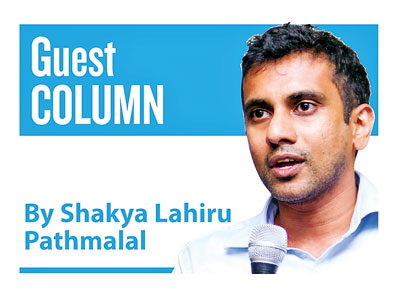Start-up 2.0 (The next generation): What to expect in the next 5 years
View(s):Start-up 1.0 started in 2010 when Rajan Anandan and Prajeeth Balasubramaniam began a concerted effort to build the Sri Lankan start-up eco-system. There were start-ups before in the technology field but this was the first time an effort was made to invest in a large amount of start-ups by getting as many investors and entrepreneurs together as possible. This was the birth of the Lankan Angel Network. Takas.lk is a product of Start-up 1.0 and now looking at the next level of growth and disruption.
Lessons learned from 1.0
1)What matters most in start-ups, above everything else,is the ability of a team; to pivot, grow, stick together through good times and bad and the ability to execute.
2) Growth at any cost is a fallacy and at most times leads to trouble (this bucks the general thought process of entrepreneurs and investors alike). Rajan Anandan stated building a successful start-up is like playing a Test Match and not a T20. Businesses take time to grow; there are no such things as overnight success stories.
3) Investment in technology is critical. Any growth business has to have a strong technology element being the backbone of its growth.
4) “It takes a village to raise a child”. The eco-system matters, building a start-up requires many elements including the entrepreneurs, a great talent pool, a good addressable market, policy framework and investors who can invest both their time and money.
5) Entrepreneurs and investors have learned that they have to invest their time and money in business that can seriously scale. Niche business in small economies such as ours does not have serious growth potential.
What to expect at Start-up 2.0
What could we expect to see at Start-up 2.0 for both the eco-system and Sri Lanka in general?
1) There is now more funding than ever before for start-ups. With a few start-ups in Sri Lanka raising close to US$1 million, this risk capital is essential element in the start-up growth story.
2) There has to be a clear path to profitability for a start-up. Takas.lk has a clear way to hit profitability; our growth plans are intertwined with a plan to be profitable.
3) Serious disruption to take place on how business is being conducted in Sri Lanka. Currently a majority of top companies have built traditional businesses and are very low on innovation and competitiveness (this explains our very low GDP to export ratio) thus, being intentionally uncompetitive. These traditional businesses will get disrupted by the start-ups that have gone from 1.0 to 2.0.
4) The rise of venture capital. While there is enough funds available at the seed stage through angel investors, the later stage start-ups still lack venture funding to go to the next level. Rajan and Prajeeth have started BOVCapital a venture fund based out of Singapore to fund these start-ups. But there needs to be more of these funds coming in.
5) Sri Lanka will most likely in the next five years create a regional/global start-up which will put us on the technology and innovation map.
I believe that the start-up ecosystem in Sri Lanka is still nascent and faces the challenges that every start-up ecosystem at this stage of development would have. But what this means is once these difficulties have been overcome there is a serious upside to what returns start-ups can deliver to the country. In the US investments in start-ups is less than 0.5 per cent of GDP but contribute to more than 10 per cent of its economy! This will be the case in Sri Lanka too.
(The writer is the co founder-CEO of takas.lk. His opinions are his own and do not necessarily reflect that of the organisation).


